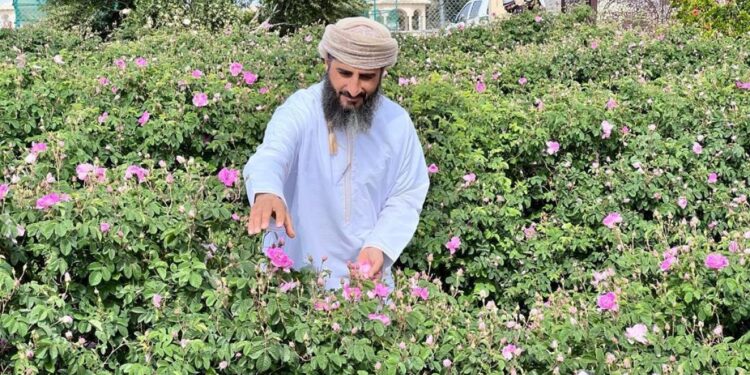At six in the morning, when the fog remained a white thread, wrapping the mountains of the Green Mountain in the Sultanate of Oman, Ahmed bin Abdullah Al -Saqri comes out of the gate of his metal factory, carrying his basket.
A few meters distance extends his own farm where hundreds of rose trees are planted adjacent to the factory walls, the first open petals are selected.
Its basket fills and its insertion returns to the metal factory, where the daily “dialogue” begins between imitating its ancestral inheritance, and modern technology that carried rose water to the global “Amwaj” shelves of perfumes.
Al -Saqri says in a statement to Al -Jazeera Net that his relationship with the roses started since he was a child, as he was accompanying his father to the fields and helping him to collect roses and distress him in the traditional way, before he went to study the science of agricultural administration that polished his passion for innovation.
In the year 2018, Al -Saqri reclaimed a rocky plot and planted 1300 rose trees, then bought a Chinese distillation device capable of treating 200 kilograms of crude in one cycle, and after a year of experiment the first liter of pure white rose water came out under a special sign he called the “mountain flower”.
From firewood for pressure and steam
The shadow of Omani roses dripped for centuries in copper pots that feed with firewood 24 hours continuously, so the resulting rose water tended to red and carried the flavor of “burning”, and left for two months until they were described.
But Ahmed Al -Saqri decided to cut the connection in this traditional way when he imported a 200 kg fibroid distillation device that works with compressed steam.
This device does not exceed 4 hours operating cycle, and it produces about 150 liters of pure white rose water, along with approximately 4 millimeters of concentrated rose oil, and the rose water and its and its item under the name “Rose of the Mountain” in elegant glass packages, while the distillation waste (ground petals) are sold to local companies that make soap and shampoo with a concentration of 80% of the rose extracts.
The factory also expanded to the area of distillation of other aromatic plants, such as Alasab, Elias, lavender and lemon herb, to become water and oils used in alternative medicine and perfume treatment.
To expand the scope of its activity, Amwaj International Perfumes signed a cooperation agreement with Al -Saqri to use its aromatic oils in its products, which represented a qualitative leap in its career, as it opens the way for this Omani product to enter a thirsty international market for rare natural smells.
Challenges and resources
Success was not without obstacles. The Green Mountain has a rocky nature and the water sources in it are limited.
To secure irrigation, Al -Saqri dug a 36,000 gallon (more than 133 thousand liters) ground tanks (more than 133 thousand liters) to collect rain water, and the drip irrigation system was approved that provides 30% of consumption.
The project owner also relies on moisture sensors connected to the phone to alert workers to the optimum humidity levels of each category, in a step that describes it as “smart cultivation” that reduces waste and doubles productivity.
Al -Saqri realizes that the sustainability of the project requires a solid scientific base, and therefore leads an initiative to establish the Omani Roses Experience Center in cooperation with the University of Technology and Applied Sciences in the Omani capital, Muscat.
The center also aims to provide training courses for farmers in fine agriculture, as it hosts a laboratory to test oil and recording patents for special aromatic installations.
Al -Saqri aspires to extract medicinal vehicles from roses, Al -Alath, Elias, Al -Hadda, Al -Antar, Rosemary, etc. after proving its laboratory effectiveness, which may contribute to opening a new pharmaceutical market that generates a return that exceeds the profits of the current perfume industry.



